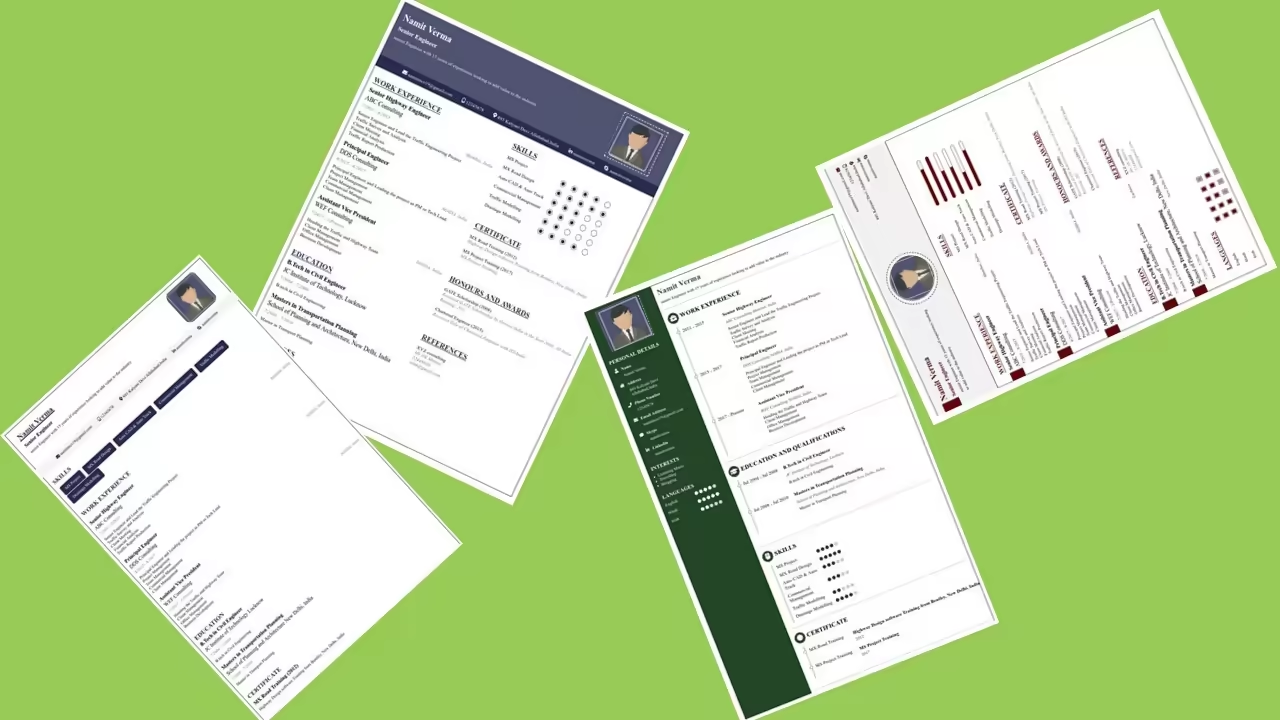A well-written CV can assist you in gaining entry to the firm of your dreams. But its easier said than done to figure out how to make your CV entirely representative of your experience while still standing out. After all, hiring managers and recruiters only view your resume for around 7 seconds before determining whether or not to move forward. Most people understand the essentials of how to put together a good work history, but here are a few pointers you may not have heard before that might help your resume pass the 7-second test.
By providing a clear, succinct CV that emphasizes your qualifications for the open position, you can make a solid first impression. In this article, we define a resume and offer advice on how to write one that will make an impact.
Related: How to write a CV that gets shortlisted by both robots and humans
What exactly is a resume?
A resume is a document that highlights a job candidate's qualifications. It frequently includes information about their education, experience, skills, and accomplishments. A resume is an excellent approach to demonstrate how you could benefit the organization. A well-crafted CV is an excellent method to distinguish yourself from other individuals looking for the same position.
Using a customizable resume template can help ensure your resume is both professional and tailored to the job. A strong template provides structure and readability, making it easier for hiring managers to recognize your qualifications. When writing a resume, it's also crucial to know your sector and the hiring business you're applying to so you can adapt your CV to both.
Related: Mastering Resume Skills: How to Showcase Your Abilities and Land Your Dream Job
Unique resume tips
There are several strategies to make your CV stand out from the crowd. What a recruiter looks for will vary depending on your industry and the job you're applying for, but hiring managers are looking for resumes that stand out. Here are some things to consider while you draft your resume:
1. Only include your address if it is beneficial to you
Include your address if you're searching for jobs in the city or town where you currently reside. In this situation, it informs the hiring manager that you are already in the area and might perhaps begin working immediately.
However, if you're applying for jobs in a different location and may need to relocate to begin working, it's usually best to remove your current address from your CV. Why? Because relocation expenses are often required, recruiters are sometimes less enthusiastic about interviewing prospects from another city or state.
Related: What Not to Put on your cv
2. Name dropping
While it may be bad manners to drop names in ordinary conversation, you must do so on your CV. Include names of well-known clients or companies if you've worked with them. "Closed deals with Google, Toyota, and Bank of America" will grab the attention of recruiters in no time.
3. Put your performance evaluations to good use
You may not expect to look to your yearly review for resume fodder, but reviewing favorable input from previous years can help you discover your most notable accomplishments and greatest work traits – two things that should be highlighted on your resume. You can avoid needing to use "fluff" to fill out your work experience by including specific feedback you've received and objectives you've met by including specific feedback and goals you've met.
4. Don't overdo it with the keywords
Many firms and recruiters employ keyword-scanning software to cut down the pool of job candidates. As a result, it's critical to incorporate keywords from the job description on your CV - but not too many. "Keyword stuffing" can be detected by recruiters from a mile away.
Related: These Resume Keywords will help you get your dream job
5. Follow standard email etiquette
Your current work email address, as well as an extremely personal or inappropriate email address, such as kissmorelove25@gmail.com, should not be used on your resume or while applying for a job via email. To make the best possible impression, stick with something professional based on your name.
6. When it comes to abilities, quality should always take precedence over quantity
There's no need to highlight talents that the majority of people in the job market have (Think: Microsoft Office, email, Mac, and PC proficiency), which can make it appear as if you're merely trying to fill up page space. Keep your talents section brief and sweet, and only list skills that are directly related to the position you're looking for.
Related: Soft skills are required now and in the future
7. Choose when and how to share social media accounts
The practice of including links to social media profiles on a resume is becoming increasingly popular. However, it's crucial to distinguish between professional accounts—such as a LinkedIn profile or an Instagram accounts you maintain for work—and personal accounts, such as your personal Twitter or Facebook account. While it may be tempting to include a personal account to show recruiters who you are, you should limit yourself to only listing professional accounts. Save your charismatic personality for a face-to-face interview.
Related: Here Are 9 Reasons You May Not Be Hired-and What You Can Do About It
8. Make the most of your activities
Some hobbies, but not all, warrant a spot on your CV. It's recommended to consider hobbies that showcase good personality traits or talents that could help you in the workplace. Running marathons (which demonstrates discipline and commitment) and writing about a topic connected to your industry (which demonstrates originality and genuine passion in your work) are two hobbies that will help you shine and attract a recruiter's attention.
9. Avoid using general adjectives
Most people's resumes will include terms like hardworking, self-motivated, self-sufficient, proactive, and detail-oriented. However, while most job seekers are motivated and hardworking, these characteristics don't set you out from the competition. Instead, concentrate on the precise abilities and accomplishments that set you apart from the other candidates.
10. Keep a record of your accomplishments
Keeping track of your professional achievements and good feedback as they occur can make putting together or updating your resume a breeze. Include as many details as possible so you don't have to go back and look for them afterwards.
Related: Adding leadership skills to your resume
11. Include a heading as well as a summary or goal
Recruiters go through a large number of resumes every day. Including a header, summary, or objective can assist hiring managers stand out from the crowd. Make sure your name is at the very top of any header you create. If you have room, increase the text size somewhat. Include your physical address (or just your city and state), phone number, and email address. Include the best way for the recruiting manager to get in touch with you.
Write a summary or objective directly beneath your headline. A summary is a three-sentence paragraph that summarizes your relevant experience and talents. Your professional aim and the abilities you can provide to the firm are explained in your objective. It's only two sentences long. One of these phrases summarizes your resume at the beginning, allowing hiring managers to rapidly scan it and learn more about you.
12. Keep it short and sweet
A resume can be two pages lengthy, however, the bulk of them should be one page. This is frequently the case for inexperienced entry-level candidates. When you’re writing your resume, make sure you only include facts that will help you stand out from the crowd. Redundancy and fluff should be avoided.
13. Work on the visuals
While a well-designed CV will impress recruiters, be sure your creativity is professional. When creating a modern CV, keep the following points in mind:
- Make sure the font you're using is readable. Georgia, Times New Roman, Calibri, and Helvetica are examples of professional fonts.
- Font size: Choosing a font that is the right size will ensure that a recruiter can read the content of your resume. A font size of 12 should be sufficient.
- Template: Keep your designs simple and pleasing to the eye. If you're using a template, make sure the visual components don't take away from your resume's content.
14. Proofread, proofread and proofread
Before submitting your resume, double-check any errors. A CV that is devoid of errors and simple to read indicates your professionalism and attention to detail. If you personalize your resume for each job application, make sure to read it thoroughly each time, or have a trusted friend or family member do it for you.
15. Include relevant talents
Only mention abilities that are relevant to the position you're looking for, just as you did with your past jobs. Look for talents or prerequisites that the hiring manager is searching for in the job posting. When applying for a graphic design job, for example, listing your understanding of design applications and programs might be beneficial.
This article was written by Nicholas T. Mushayi, a consultant at Industrial Psychology Consultants. He can be contacted at nicholas@ipcconsultants.com

